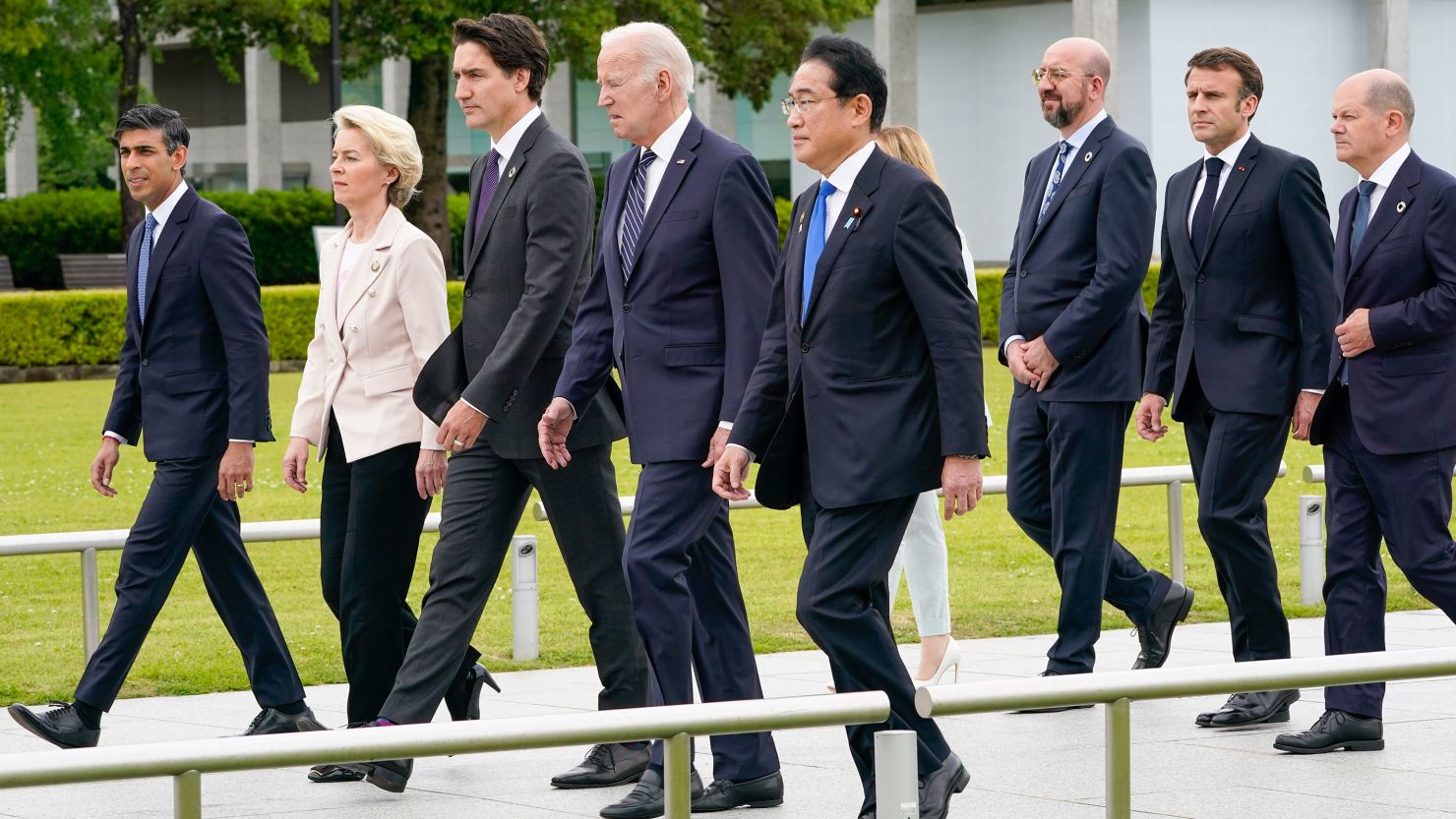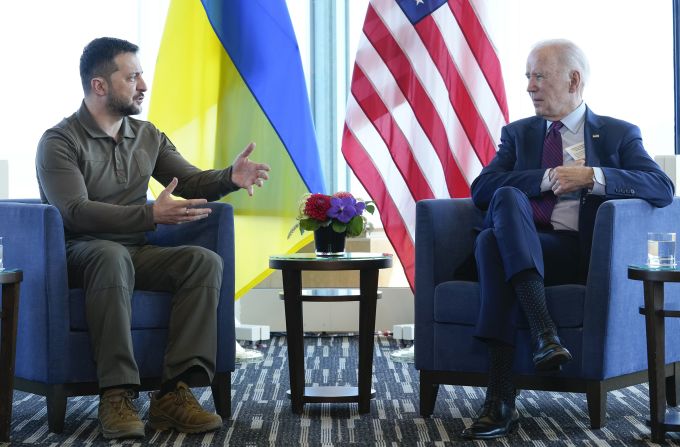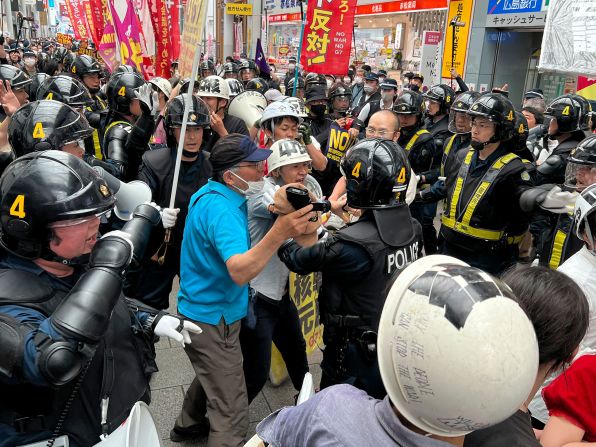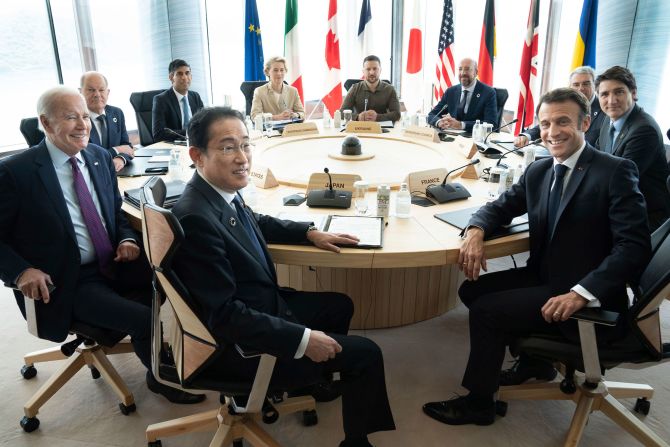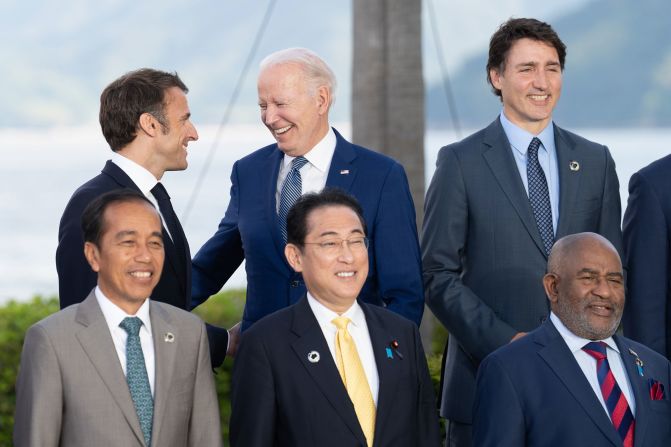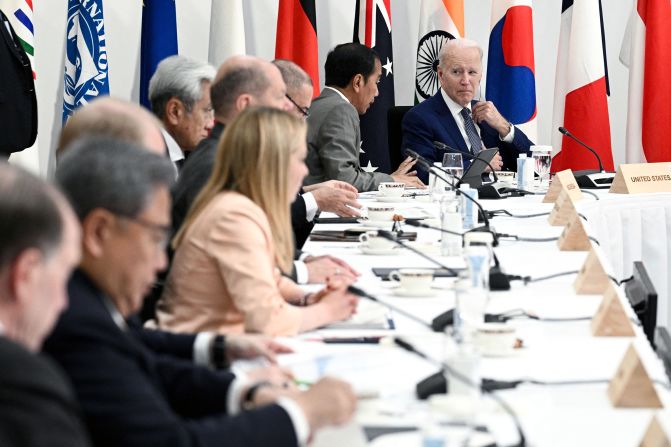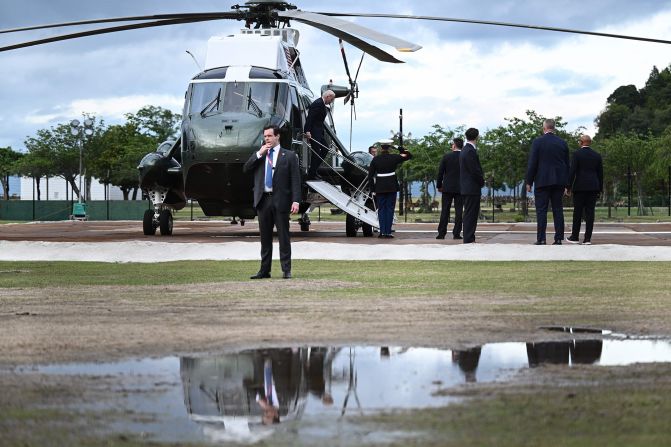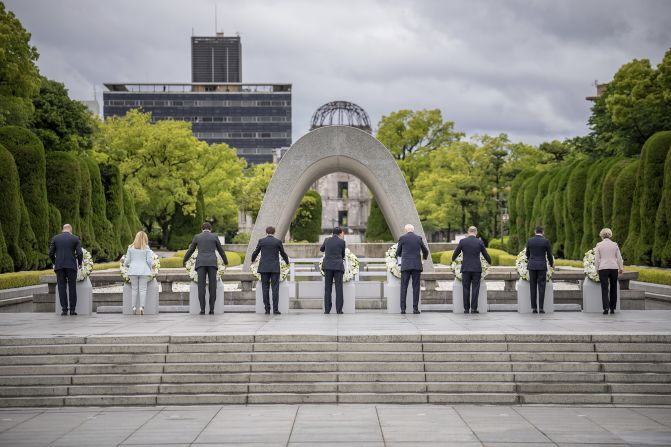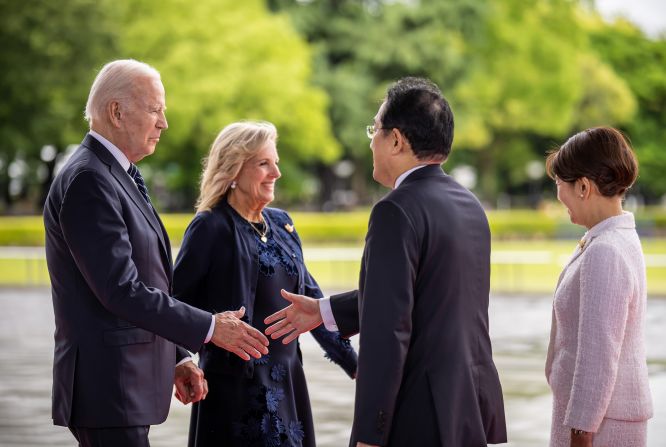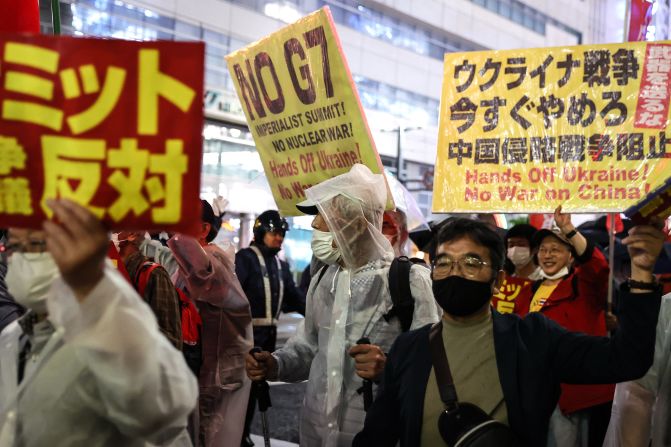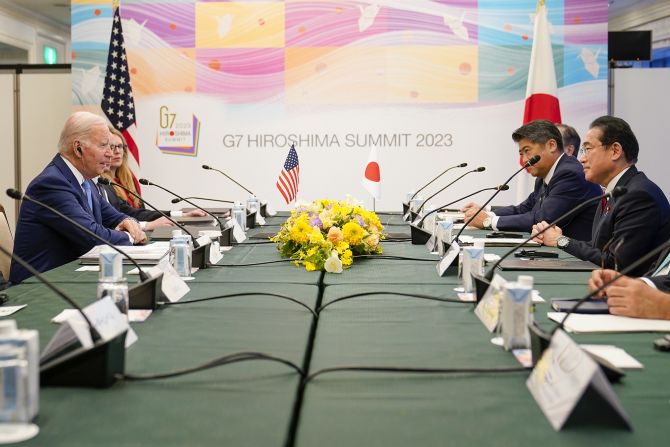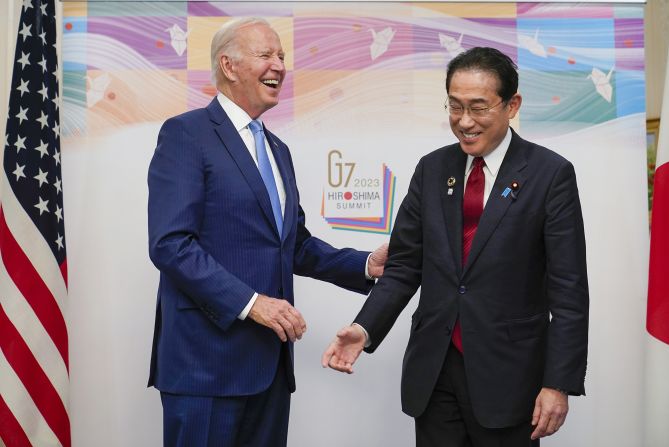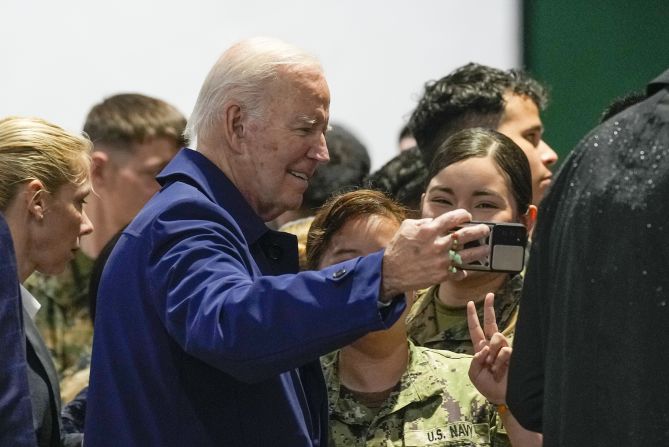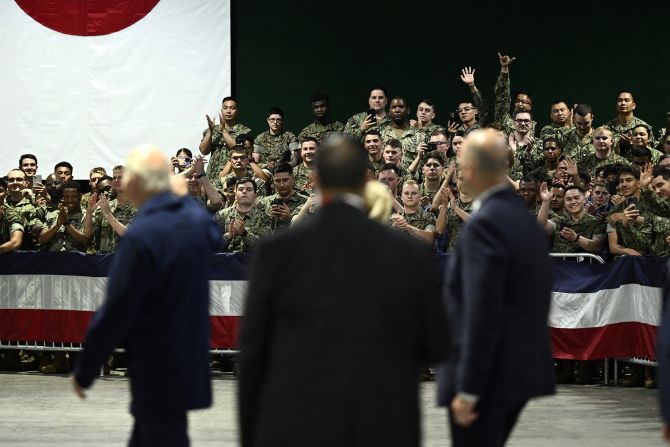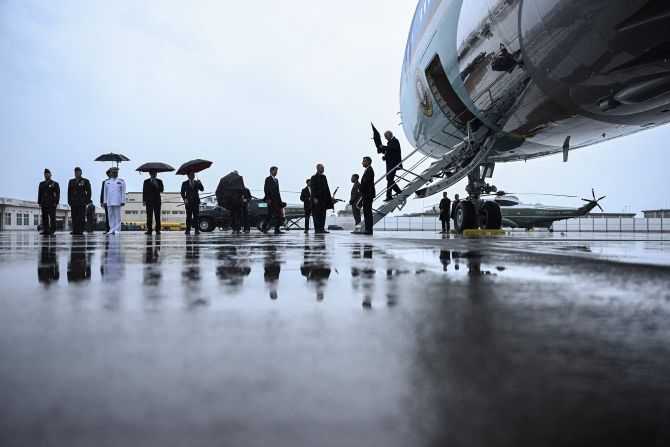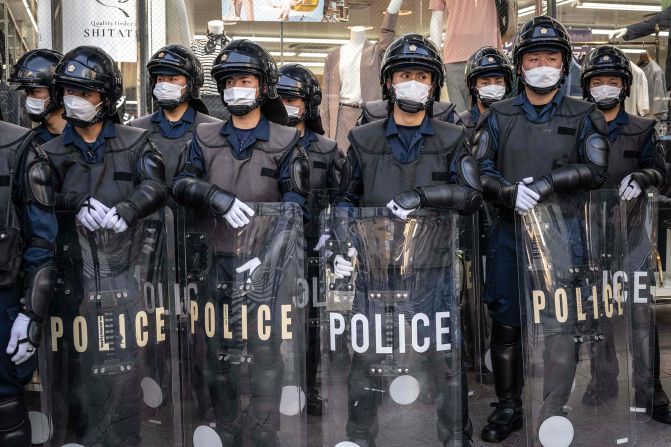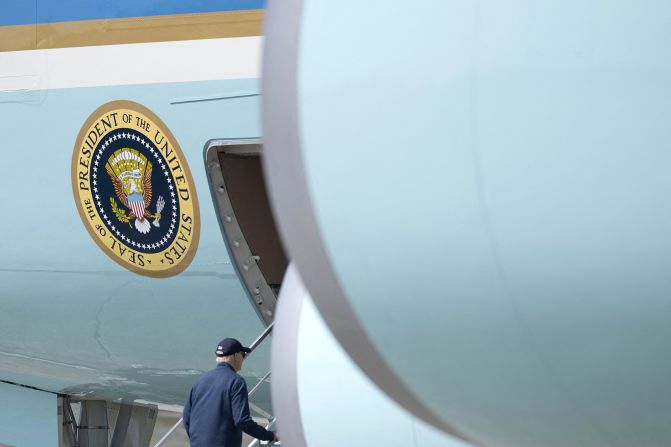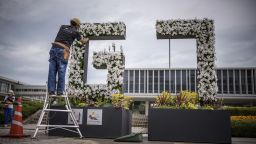US President Joe Biden and fellow world leaders unveiled tough new sanctions on Russia as they prepared to hear in-person later this weekend from Volodymyr Zelensky, who officials said was planning a dramatic trip to Japan as he continues to appeal for military assistance amid Russia’s invasion.
The new sanctions are designed to plug loopholes and go after untapped industries as Western leaders continue to work toward choking off Moscow’s war financing.
Leaders from the Group of Seven nations, which is comprised of the United States, Japan, Germany, the United Kingdom, France, Canada and Italy, met Friday afternoon in the Japanese city of Hiroshima where the war was a central topic of discussion as Ukrainian forces prepare for a counteroffensive.
The group later released a joint statement that “reaffirmed” their commitment to stand against Moscow’s “illegal, unjustifiable, and unprovoked” invasion.
The new sanctions would “increase the costs to Russia and those who are supporting its war effort,” and build on efforts to “ensure that Russia is no longer able to weaponize the availability of energy,” the statement added.
The leaders also renewed their commitment to provide “the financial, humanitarian, military and diplomatic support Ukraine requires for as long as it takes,” echoing previous vows of support for Kyiv.
“Our support for Ukraine will not waver. We will not tire in our commitment to mitigate the impact of Russia’s illegal actions on the rest of the world,” the joint statement said.
The Ukrainian leader is expected to address the group in person this weekend.
Officials declined to say exactly when Zelensky would arrive or detail his travel arrangements. He has been traveling outside his country more as the war grinds onward, including a tour of Europe last week.
The lengthy trip from Ukraine to Hiroshima, a deeply symbolic location, underscores Zelensky’s desire to strengthen support fourteen months into the war.
The menacing nuclear undertones to Russia’s invasion were placed into sharp relief as the summit got underway.
Leaders laid wreaths at the Hiroshima Peace Memorial, the epicenter of the American atomic bomb dropped here in 1945 that wiped out the city and more than 100,000 of its inhabitants while hastening the end of World War II.
In pictures: President Joe Biden visits Japan
In the background was the Atomic Bomb Dome, now a monument and UNESCO World Heritage Site. The dome was formerly the Hiroshima Prefectural Industrial Promotion Hall, and the atomic blast struck almost directly above it, leaving the frame of its iron dome largely intact.
It was against that backdrop that Biden and his fellow leaders entered three days of talks.
The US said Friday it would tighten export controls, including by “extensively restricting categories of goods key to the battlefield,” and announced nearly 300 new sanctions against “individuals, entities, vessels, and aircraft.”
The US Treasury Department significantly expanded its sanctions authorities to target those operating in Russia’s architecture, engineering, construction, manufacturing and transportation sectors – a move that complements its ability to sanction those in other key parts of the Russian economy, including the defense sector.
The US State Department unveiled a slew of new sanctions as well, including designations on officials tied to Russia’s illegal transfers of Ukrainian children and on a number of Putin aides. They designated several companies said to be involved in the theft of Ukrainian grain, entities tied to the “logistics network” between Russia and Iran, including two Iranian shipping companies, and a unit of the Russian Defense Ministry and a Russian state-owned enterprise for supporting the Wagner Group.
The United Kingdom said it will ban the import of Russian diamonds, as part of its latest sanctions against Moscow, Downing Street announced on Friday. The move aims to restrict one of Russia’s few remaining export industries that had been relatively untouched by the withering western sanctions already in place.
Imports of Russian-origin copper, aluminum, and nickel will also be banned under the UK legislation, which will be introduced later this year, the prime minister’s office said in a statement.
The Russian diamond industry was worth $4 billion in exports in 2021, according to Downing Street.
Australia also announced its own measures including a ban on the export of all machinery and related parts to Russia and sanctions targeting 21 entities.
Default distractions
Biden faces his fellow world leaders Friday in Japan under the shadow of a looming default on US debt, a scenario his advisers said risks subverting American leadership and sending the global economy into tailspin.
The risk appears particularly acute as Biden works to rally fellow G7 officials behind a shared approach toward Russia and China.
Before arriving, Biden was briefed on the debt ceiling standoff by aides.
“The President’s team informed him that steady progress is being made,” a White House official said.
The call lasted 20-30 minutes, press secretary Karine Jean-Pierre told pool reporters traveling with the President.
A separate source with knowledge of the talks said — despite the optimism and positive signals — there is a long way to go to get a deal and it’s unclear if negotiators reach one by this weekend or if it will slip into next week.
How much the debt standoff arises in Biden’s talks in Hiroshima remains to be seen; some European officials said they had been down similar roads before as American leaders worked to avert financial disaster only to find a solution at the last moment.
But even if it does not arise substantially in the many hours of leaders’ meetings spanning the next three days, the risk of default remains the backdrop against which Biden will attempt to project strength this week in Japan.
“Debt ceiling brinkmanship that Republicans are driving in Washington, DC, undermines American leadership, undermines the trustworthiness that America can bring to not just our allies and partners but to the rest of the world,” a senior administration official said as Biden began the high-stakes G7 summit.
Truncated Asia tour
Biden cut his trip to Asia short to return to Washington early as negotiations continue over raising the US borrowing limit ahead of June 1, the earliest date by which the country could run out of cash to pay its bills.
China and artificial intelligence, are also up for discussion at G7.
And it was clear from Biden’s decision to cancel planned stops in Australia and Papua New Guinea – Secretary of State Antony Blinken will make a two-day visit to the latter instead – that other matters are weighing on the US president’s time.
To that end, Biden brought with him to Japan a top domestic policy aide, Bruce Reed, to keep him continually updated on the status of talks between White House aides and congressional Republicans.
Just the threat of default has the potential to weaken American diplomatic authority, the official said, citing a sanctions regime on Russia that relies on the strength of the US financial system.
“All of those things reduce America’s capacity to lead,” the official said.
Biden’s meetings with fellow leaders in Hiroshima will present “an opportunity to highlight just how essential it is that that the Republicans work to get this done expeditiously with the president, because a lot is riding on ensuring that the United States continues to lead and lead alongside the G7.”
The sanctions come 14 months after Russia launched its invasion and as Ukraine prepares for a counteroffensive using billions of dollars in Western military aid.
Biden and fellow leaders were planning to discuss how much progress has been made on the battlefield, with an eye toward helping Ukraine regain territory and assume leverage in potential peace talks.
While the US remains Ukraine’s largest contributor of military assistance, some leaders have begun calling for ever-more-advanced weapons, including fighter jets, to send Kyiv. Biden has resisted those calls as he works to prevent an escalation.
This story has been updated with additional developments.
CNN’s Junko Ogura in Hiroshima and Sophie Jeong in Hong Kong contributed to this report.




